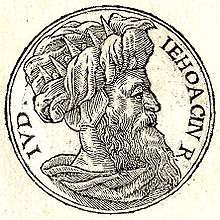
Jeconiah
Jeconiah (Hebrew: יְכָנְיָה [jəxɔnˈjɔː], meaning "God will fortify (his people)"; Greek: Ιεχονιας; Latin: Iechonias, Jechonias), also known as Coniah and as Jehoiachin (Hebrew: יְהֹויָכִין [jəhoːjɔːxiːn]; Latin: Ioachin, Joachin), was a king of Judah who was dethroned by the King of Babylon in the 6th century BC and was taken into captivity. He was the son and successor of King Jehoiakim. Most of what is known about Jeconiah is found in the Hebrew Bible. Records of Jeconiah's existence have been found in Iraq, such as the Jehoiachin's Rations Tablets. These tablets were excavated near the Ishtar Gate in Babylon and have been dated to c. 592 BC. Written in cuneiform, they mention Jeconiah ("Ia-'-ú-kinu") and his five sons as recipients of food rations in Babylon. Comparing Babylonian records with date references found in Hebrew biblical texts, the length of Jeconiah's captivity can accurately be determined.
Jeconiah in Scripture
Reign
Jeconiah reigned three months and ten days, from December 9, 598 to March 15/16, 597 BC. He succeeded Jehoiakim as king of Judah in December 598, after raiders from surrounding lands invaded Jerusalem and killed his father. It is likely that the king of Babylon was behind this effort, as a response to Jehoiakim's revolt, starting sometime after 601 BC. Three months and ten days after Jeconiah became king, the armies of Nebuchadnezzar II seized Jerusalem. The intention was to take high class Judahite captives and assimilate them into Babylonian society. On March 15/16th, 597 BC, Jeconiah, his entire household and three thousand Jews, were exiled to Babylon.
Podcasts:

